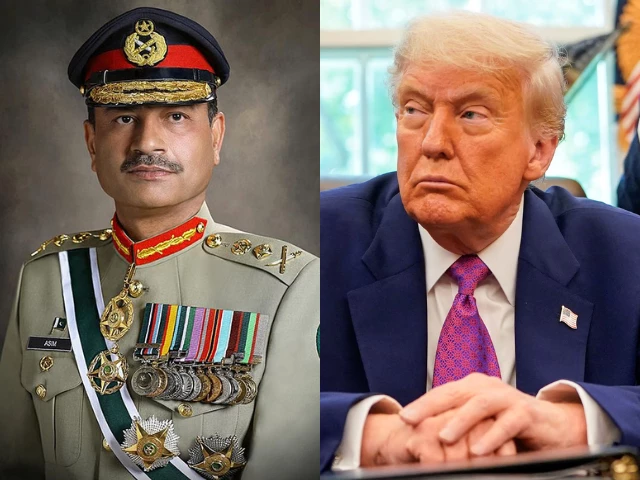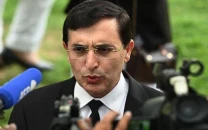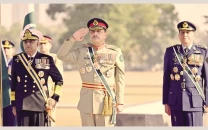Trump calls meeting COAS Munir an honour at White House luncheon
US president shares meeting covered Middle East conflict, says Pakistan knows Iran well and is unhappy with situation

US President Donald Trump said it was an honour to meet Chief of Army Staff (COAS) Field Marshal Asim Munir during a luncheon held at the White House on Wednesday.
Speaking to the media after the event, Trump extended his gratitude to Pakistan's military chief for visiting and acknowledged the army chief’s role in helping avert further military escalation with India.
“It is an honour for me to meet Asim Munir,” Trump said. “I invited him to thank him for not going to war. He deserves appreciation for helping secure the ceasefire.”
“Pakistan and India are both nuclear powers,” the US president said. “We’re in talks with Pakistan on a trade agreement. The leadership of both nations is truly remarkable.”
The luncheon followed recent tensions between Pakistan and India, two nuclear-armed neighbours who have seen a sharp rise in hostilities. Trump noted the gravity of the situation and stressed the importance of dialogue and restraint.
Trump said that Iran came up during his meeting and both discussed the recent Middle East conflict. “They know Iran very well, better than most,” Trump said during a media interaction following their Cabinet Room meeting at the White House, adding, “And they're not happy about anything.”
The president stated that Pakistan is familiar with both Iran and Israel, but has deeper insights into Iran due to proximity and long-standing regional dynamics.
“It’s not that they're bad with Israel. They know them both, actually, but they probably know Iran better,” Trump remarked. “He [Asim Munir] agreed with me.”
COAS Munir was expected to press Trump not to enter Israel's war with Iran and seek a ceasefire, Pakistani officials and experts said. A section of Pakistan's embassy in Washington represents Iran's interests in the United States, as Tehran does not have diplomatic relations with the US.
Pakistan has condemned Israel's airstrikes against Iran, saying they violate international law and threaten regional stability.
Read: PM decries Israeli aggression as a threat to regional peace
Asked what he wanted to achieve from the meeting, Trump told reporters at the White House: "Well, I stopped a war ... I love Pakistan. I think (Indian Prime Minister Narendra) Modi is a fantastic man. I spoke to him last night. We're going to make a trade deal with Modi of India.
"But I stopped the war between Pakistan and India. This man was extremely influential in stopping it from the Pakistan side, Modi from the India side and others," he did, referring to Munir. "They were going at it - and they're both nuclear countries. I got it stopped."
Trump's lunch with Field Marshal Munir represented a major boost in US-Pakistan ties, which had largely languished under Trump and his predecessor Joe Biden, as both assiduously courted India as part of efforts to push back against China.
It was the first time that a US president has hosted the powerful head of Pakistan's army, widely regarded as having sway over the country's national security policies, at the White House unaccompanied by senior Pakistani civilian officials.
🚨فیلڈ مارشل سید عاصم منیر امریکی صدر ڈونلڈ ٹرمپ کے ظہرانے میں شرکت کیلئے وائٹ ہاوس پہنچ گئے.
pic.twitter.com/IFmv1nv4hA— Mahii (@Mahii_Baloch1) June 18, 2025
Trump had said last month that the nuclear-armed South Asian neighbours agreed to a ceasefire after talks mediated by the US, and that the hostilities ended after he urged the countries to focus on trade instead of war.
However, Modi told Trump in a phone call late on Tuesday that the ceasefire was achieved through talks between the Indian and Pakistani militaries and not US mediation, according to India's most senior diplomat, Foreign Secretary Vikram Misri.
Pakistan has thanked Washington for playing a mediating role, however, India has repeatedly denied any third-party mediation.
Tuesday's phone call between Modi and Trump on the sidelines of the G7 summit in Canada, which Modi attended as a guest, was the two leaders' first direct exchange since the May 7-10 conflict.
Also Read: Modi tells Trump 'no' US role in ceasefire with Pakistan
"PM Modi told President Trump clearly that during this period, there was no talk at any stage on subjects like India-US trade deal or US mediation between India and Pakistan," Misri said in a press statement.
"Talks for ceasing military action happened directly between India and Pakistan through existing military channels, and on the insistence of Pakistan. Prime Minister Modi emphasised that India has not accepted mediation in the past and will never do," he said.
Misri said the two leaders had been due to meet on the sidelines of the G7 summit but Trump left a day early due to the situation in the Middle East.
Trump asked Modi if he could stop by the US on his return from Canada, Misri said, but the Indian leader expressed his inability to do so due to a pre-decided schedule.
Read More: Ceasefire after fire and fury
The heaviest fighting in decades between India and Pakistan was sparked by an April 22 attack in Indian Illegally Occupied Jammu and Kashmir that killed 26 people, most of them tourists. New Delhi blamed the incident on "terrorists" backed by Pakistan, a charge denied by Islamabad.
Pakistan conducted Operation Bunyanum Marsoos in response to Indian military’s dastardly attacks that began on the night of May 6 and 7, resulting in the loss of innocent civilian lives, including women, children, and the elderly.
On May 10, Pakistan deployed its Al-Fatah missile and targeted multiple Indian military installations. However, after the intervention of Donald Trump, a full and immediate ceasefire was reached between India and Pakistan.
Pakistan has previously said that the ceasefire happened after its military returned a call the Indian military had initiated on May 7.


























COMMENTS (1)
Comments are moderated and generally will be posted if they are on-topic and not abusive.
For more information, please see our Comments FAQ